Rob Mclennan's Blog, page 100
February 2, 2023
periodicities : a journal of poetry and poetics
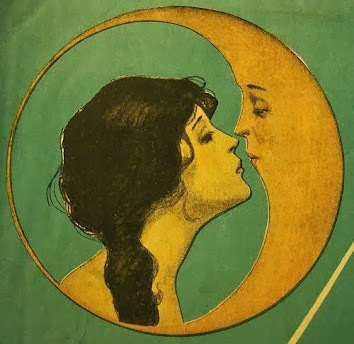 Recently on periodicities: a journal of poetry and poetics: new poetry by Amanda Earl, Miranda Mellis, Guy Elston, Derek Beaulieu, kevin mcpherson eckhoff, Kate Siklosi, Ariel Gordon,Daniel Sarah Karasik, Julia Polyck-O’Neill, Kevin Varrone, Carlos Soto Román, Dani Spinosa and Meredith Stricker; reviews of work by John Wall Barger (by Kevin Spenst), Nancy Jo Cullen (by Kim Fahner), David Ly (by Jérôme Melançon), Khashayar Mohammadi and Saeed Tavanaee Marvi (by rob mclennan), Kim Fahner (by Jérôme Melançon) and Peter Burghardt (by rob mclennan); Michael Sikkema interviews Scott Ferry; George Bowering, Derek Beaulieu and Melanie Dennis Unrau each write on their recent above/ground press chapbooks; Residency Reports by Jason Heroux, Lisa Pasold and Lee Ann Roripaugh; Geoffrey Young offers three more in his ongoing "DATES" series; Kristen Tapson on Bernadette Mayer, D.S. Black on Michael McClure; Han VanderHart & Amorak Huey on River River Books, and Sarah Gzemski on Noemi Press; and "Process Notes," curated by Maw Shein Win, by James Cagney, Caroline Goodwin, Susana Praver-Pérez, Linda Norton and rob mclennan (with more forthcoming, including Colin Partch)
Recently on periodicities: a journal of poetry and poetics: new poetry by Amanda Earl, Miranda Mellis, Guy Elston, Derek Beaulieu, kevin mcpherson eckhoff, Kate Siklosi, Ariel Gordon,Daniel Sarah Karasik, Julia Polyck-O’Neill, Kevin Varrone, Carlos Soto Román, Dani Spinosa and Meredith Stricker; reviews of work by John Wall Barger (by Kevin Spenst), Nancy Jo Cullen (by Kim Fahner), David Ly (by Jérôme Melançon), Khashayar Mohammadi and Saeed Tavanaee Marvi (by rob mclennan), Kim Fahner (by Jérôme Melançon) and Peter Burghardt (by rob mclennan); Michael Sikkema interviews Scott Ferry; George Bowering, Derek Beaulieu and Melanie Dennis Unrau each write on their recent above/ground press chapbooks; Residency Reports by Jason Heroux, Lisa Pasold and Lee Ann Roripaugh; Geoffrey Young offers three more in his ongoing "DATES" series; Kristen Tapson on Bernadette Mayer, D.S. Black on Michael McClure; Han VanderHart & Amorak Huey on River River Books, and Sarah Gzemski on Noemi Press; and "Process Notes," curated by Maw Shein Win, by James Cagney, Caroline Goodwin, Susana Praver-Pérez, Linda Norton and rob mclennan (with more forthcoming, including Colin Partch)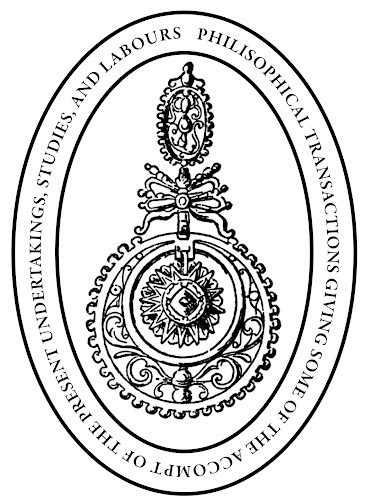 as well as pieces reprinted from various of the Report from the Society festschrift series, including pieces critical and creative, including Sarah Dowling, Sarah Heady and Barbara Cole on Pattie McCarthy (with further volumes forthcoming!
as well as pieces reprinted from various of the Report from the Society festschrift series, including pieces critical and creative, including Sarah Dowling, Sarah Heady and Barbara Cole on Pattie McCarthy (with further volumes forthcoming!with forthcoming work by: Jason Heroux, Daniel Barbiero, Nathanael O’Reilly, Matthew Tomkinson, Lindsey Webb and Martin Breul (among plenty of others)
and a reminder: periodicities is open to submissions of previously unpublished poetry-related reviews, interviews and essays. We are also seeking pieces (essays/interviews etc) on the Canadian long poem!
Please send submissions as .doc with author biography to periodicityjournal (at) gmail.com
For the time being, submissions of previously unpublished poetry will be by solicitation-only, with the exception of translated works (which you should very much send along! please send translations!).
ALSO: periodicities is seeking essays in its #FirstRealPoets series, a series originally prompted by this piece by Canadian poet Zane Koss on Stuart Ross. Who was the first real poet you ever encountered in the flesh? How did that encounter shape your approach to poetry? How does that poet make poetry a possibility for people who might not otherwise see themselves as poets? We hope to read essays about real poets' poets. The poets who might not get the critical recognition they deserve but are nonetheless important community-creating figures who welcome and encourage new voices.
ALSO: periodicities is seeking short essays on a particular older book by another poet, a series originally prompted by Ken Norris, who wrote this piece on Michael Ondaatje's Rat Jelly.
periodicities: a journal of poetry and poetics,
founded March 2020
edited and lovingly maintained by rob mclennan
built as a curious extension of above/ground press (b. July 9, 1993
February 1, 2023
12 or 20 (second series) questions with David Harrison Horton
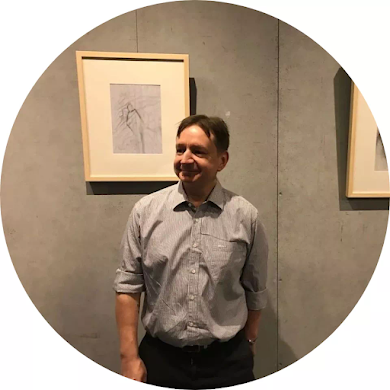 David Harrison Hortonis a Beijing-based writer, artist, editor and curator. His first full-length,
Maze Poems
, is out from Arteidolia Press. He is author of the chapbooks
Pete Hoffman Days
(Pinball) and BeiHai (Nanjing Poetry). He edits the poetry zine SAGINAW. davidharrisonhorton.com
David Harrison Hortonis a Beijing-based writer, artist, editor and curator. His first full-length,
Maze Poems
, is out from Arteidolia Press. He is author of the chapbooks
Pete Hoffman Days
(Pinball) and BeiHai (Nanjing Poetry). He edits the poetry zine SAGINAW. davidharrisonhorton.com 1 - How did your first book or chapbook change your life?
My first full-length, Maze Poems, just came out from Arteidolia Press in New York. I’m looking forward to seeing how it changes things — hopefully all for the better.
2 - How did you come to poetry first, as opposed to, say, fiction or non-fiction?
I had good English teachers in elementary and middle school at St. David’s in Detroit. Poetry was never presented as boring or something difficult, so it was fun and became something I would do (poorly) in my free time.
I started doing it more seriously in college. I studied 20th century French lit and they all seemed to be having so much serious fun with it.
3 - How long does it take to start any particular writing project? Does your writing initially come quickly, or is it a slow process? Do first drafts appear looking close to their final shape, or does your work come out of copious notes?
It really depends on the project. Maze Poems came fairly quickly after I decided that that was what I was going to use the sketchbook I bought for. After that, I worked on it regularly until I finished the notebook.
For another project, I came up with 75 titles and the form the poems would all take. After that, I wrote on average 5 poems week and finished the project fairly quickly in about two months, not including editing.
But I also have projects that I still like and want to continue on that have taken me years, sometimes decades, and they’re still nowhere near done.
4 - Where does a poem usually begin for you? Are you an author of short pieces that end up combining into a larger project, or are you working on a "book" from the very beginning?
I usually have an idea of the finished project before I begin. The planning is often part of what’s interesting in it for me. Of course, the actual finished work might only be a second cousin to the original ideas, but that’s fine too.
I admire poets that write great individual, single poems that end up in collections that showcase their breadth of interests and voice. Edward Raggcomes to mind. It’s a different approach.
5 - Are public readings part of or counter to your creative process? Are you the sort of writer who enjoys doing readings?
In Beijing, there is the Spittoon Collective that hosts monthly poetry readings and bi-weekly poetry workshops (in English). This is great for community building and has been a great boon for me. I do enjoy doing readings, and I enjoy being able to play with what doing a reading means. For one reading, I showed up with a saucepan and a drum mallet. With Spittoon, we have done neo-benshi. They also do a poetry and music series. Last year, poet and playwright James Holt independently staged a full-length poetry drama. It’s a good supportive scene.
6 - Do you have any theoretical concerns behind your writing? What kinds of questions are you trying to answer with your work? What do you even think the current questions are?
With Maze Poems, I was looking at automatic writing and the line between subconscious and conscious thought and the literal, physical, visual shape of those thoughts. I was also very interested in how reader processing inputs meaning to a text.
With most projects, whether writing or art or music or whatever, I’m often looking to see what would happen if I monkeyed with this or that? If I torqued something here or loosened it there, would it be interesting? Why or why not?
7 – What do you see the current role of the writer being in larger culture? Do they even have one? What do you think the role of the writer should be?
There are loads of roles writers can take on. Amanda Gorman took on a public role with her inauguration poem “The Hill We Climb.” Jericho Brown and Ilya Kaminskyseem to be part of larger discourses that go beyond poetry.
I often remind myself of all the Archibald MacLeish books that lined the book aisles of every thrift store in America I’ve ever been to. We’re all writing in a historical context about things that address very specific historical contexts. If we’re lucky one or a few of pieces might speak beyond that, but that isn’t really up to us.
I recently read Ted Hughes’ translation of Racine’s Phedre. I think poets translating poets is an essential role that those of us who are bi- or multilingual should consider. It’s a service to the craft.
8 - Do you find the process of working with an outside editor difficult or essential (or both)?
Working with Randee Silv from Arteidolia Press on Maze Poems was fantastic.
9 - What is the best piece of advice you've heard (not necessarily given to you directly)?
Don’t make the thing you love your job; otherwise, you’ll begin to hate it.
10 - What kind of writing routine do you tend to keep, or do you even have one? How does a typical day (for you) begin?
I do projects in spurts. I really admire poets like Stephen Ratcliffe who can do it on the daily. If I’m not writing or working on another project, I’m usually reading, making notes. I don’t usually differentiate between writing, music or art. One project usually gets 90% of my attention while I’m doing it.
11 - When your writing gets stalled, where do you turn or return for (for lack of a better word) inspiration?
Reading. Poetry, history, sci-fi, that book I should have read in college, a math text book. It doesn’t matter. It’s all interesting and gets the gears oiled up.
12 - What fragrance reminds you of home?
I grew up in Detroit and now live in Beijing. However we figure “home” here, it’s not exactly a pleasant smell.
My mom’s kitchen smelled like chicken and dumplings.
13 - David W. McFadden once said that books come from books, but are there any other forms that influence your work, whether nature, music, science or visual art?
Mazes, to state the obvious.
I had the great fortune to live and make art with a great artist like Matthew Lusk. I had the great fortune to live and make music with Jorge Boehringer, who is simply an amazing musician (Core of the Coleman). Both of them expanded my artistic vocabulary and practices.
I don’t see poetry, or writing in general, as separate from the other forms of expression and experience. They all inform each other.
14 - What other writers or writings are important for your work, or simply your life outside of your work?
Abigail Weathers is the great poet who runs the community workshops I go to.
Over the years, there have been so many people who encouraged me and pushed me along: Matthew Lusk, Jorge Boehringer, Abigail Weathers, Stephanie Young, Jackson MacLow, Pauline Oliveros, Chris DeBarr at the Downstairs Cafe. So so many others I’m grateful to know.
15 - What would you like to do that you haven't yet done?
Sell enough of Maze Poems so that Arteidiolia can fund their next project.
I already visited the world’s biggest teepee in Medicine Hat.
16 - If you could pick any other occupation to attempt, what would it be? Or, alternately, what do you think you would have ended up doing had you not been a writer?
I’ve done so many jobs: linguist, teacher/prof, librarian, editor, journalist, cook, dishwasher, chandler, prosthetic limb maker, paralegal, factory worker, golf caddy, docent, art hanger, mall retail, art model, secretary, day laborer, etc etc.
I’ve worked since I was 13 (legal in Michigan at least at the time, don’t know about now).
I would have stayed on as a chandler if it had come with health insurance.
17 - What made you write, as opposed to doing something else?
I see it more of “in addition to” other activities, rather than “as opposed to.”
18A - What was the last great book you read?
I just reread Baudelaire’s Les Fleurs du Mal. La Beaute humbles me.
18B - What was the last great film?
Spring in a Small Town. A Chinese B&W classic from 1948. I’m going through an old Chinese movie phase.
19 - What are you currently working on?
I recently listened to Orson Welles’ radio drama adaptation of Les Miserables(1937). I bought the book (I read other Hugo books in college) and want to go through it to see if anything jumps out as an interesting subject of attention, like a way to look at it or a specific part of it differently. Academically, I know it’s been done to death. But I suspect there might be artistic gold yet to be mined.
January 31, 2023
natalie hanna, lisan al’asfour
iii.
i think we can address the problem here by making
full disclosure of our respective positions in this
touchy situation, for example, i did not anticipate
in medias res, that you would drop your large warm
hand onto my thigh as ii was advising
on the tax implications of your monthly payments
and i know legalese is a little off-putting and
you’re unfamiliar with the language of rigidity
inter alia, so i will make it clear about
the next thing that happens (“index of error”)
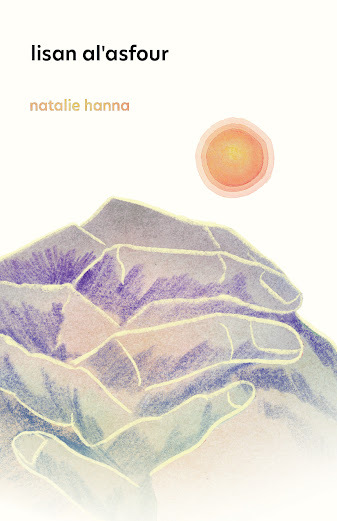 After some twenty-plus years of publishing poems in journals and chapbooks, Ottawa poet and lawyer natalie hanna’s long-awaited full-length debut is
lisan al’asfour
(Winnipeg MB: arp books, 2022), a sensual blend of narrative fragments awash with lush precision. Hers is a narrative infused with a full flow of lyric, composing a flow of phrases and fragments across an array of sentences, from short poems into extended sequences. She writes of love and lawyering, writing the heart across such boundaries and echoes of love, even while responding to a wide range of levels of racism and misogyny, whether personally or through the culture. Her lyric weaves elements of folk tale and song (consider the delicate touch of her title, an Arabic phrase that translates to “bird’s tongue,” the name of a particular Arabic soup dish), offering a poetry that sings a story or document an experience, from family offerings, responses from legal clients and even the 2022 Ottawa convoy occupation, and the inherent responsibilities of the individual to those beyond themselves. “where does your body end / and mine begin?” she asks, as part of her convoy poem, “there are some in every crowd,” writing “how many cycles / inhalation, exhalation // before we have shared all the air / in this atmosphere with each other / with the neighbourhood / across the earth? what is in you / lives in me, as risky as a kiss [.]” Throughout, hanna responds with deep empathy to poverty, grief and heartbreak, aware of both the spindle prick and the possibility of a happy ending. Of Middle Eastern descent, and raised in both English and Arabic, she writes of the distances between languages and cultures, and a blend she has yet to fully manage or master. “ya Rab, she says,” she writes, as part of the poem “naharda,” “do you ever stop talking? / i am afraid if i do not fill the universe with words / i will forget language altogether / i have already forgotten one [.]”
After some twenty-plus years of publishing poems in journals and chapbooks, Ottawa poet and lawyer natalie hanna’s long-awaited full-length debut is
lisan al’asfour
(Winnipeg MB: arp books, 2022), a sensual blend of narrative fragments awash with lush precision. Hers is a narrative infused with a full flow of lyric, composing a flow of phrases and fragments across an array of sentences, from short poems into extended sequences. She writes of love and lawyering, writing the heart across such boundaries and echoes of love, even while responding to a wide range of levels of racism and misogyny, whether personally or through the culture. Her lyric weaves elements of folk tale and song (consider the delicate touch of her title, an Arabic phrase that translates to “bird’s tongue,” the name of a particular Arabic soup dish), offering a poetry that sings a story or document an experience, from family offerings, responses from legal clients and even the 2022 Ottawa convoy occupation, and the inherent responsibilities of the individual to those beyond themselves. “where does your body end / and mine begin?” she asks, as part of her convoy poem, “there are some in every crowd,” writing “how many cycles / inhalation, exhalation // before we have shared all the air / in this atmosphere with each other / with the neighbourhood / across the earth? what is in you / lives in me, as risky as a kiss [.]” Throughout, hanna responds with deep empathy to poverty, grief and heartbreak, aware of both the spindle prick and the possibility of a happy ending. Of Middle Eastern descent, and raised in both English and Arabic, she writes of the distances between languages and cultures, and a blend she has yet to fully manage or master. “ya Rab, she says,” she writes, as part of the poem “naharda,” “do you ever stop talking? / i am afraid if i do not fill the universe with words / i will forget language altogether / i have already forgotten one [.]” There is something about hanna’s use of the lower case that intrigues, specifically her name and the narrative “I.” The late Toronto poet bpNichol utilized the lower case “i” as something predominantly visual, while others (including myself), have attempted to utilize the lower case “i” as a reduction of the narrative self (counterbalancing New York School poet Frank O’Hara’s “I did this, I did that” poetic style), arguably allowing the poem more space in which to speak for itself. The late artist and poet Roy K. Kiyooka, who spent part of his childhood in a wartime Japanese interment camp in Alberta, utilized his lower case “i” as a distinction against the dominant culture, against what he deemed “Inglish.” On her part, hanna appears to utilize hers as a blend of all of the above, allowing the lyric to flow through and be but a part of her, set on the page both resolute and firm, with a complete lack of interest in putting up with other people’s nonsense. hanna’s examinations around language and cultural distinctions are something she celebrates, even as she mourns the losses that can come through existing between two cultures. As she writes as part of the poem “tokyo cinema”:
i have stopped recording my dreams
in a book for they are all the same
dream where we are sitting at a table
in the homes askew where i grew up
and i am feeding you or you are feeding me
the home food of our ancestors
from across the middle-east and we
are crying, we are crying, with our faces
in our hands for this meal will never be perfect
and i cannot cook the rice your mother made
as you cannot cook the rice of mine, but the music
of the meal in our mouths is so close
and recalls what we have lost, and our tears
become our salt, each according to their need
and i cannot hold you, as i cannot judge you
for wanting to drown the world under your hand
in the darkness of your grief
January 30, 2023
Composition
1.
In the early stages of this writing, there
was simply no place
to put a period. I attempt to utilize
tension. My in-laws continue to believe
I should cut my hair. The tension
is present.
2.
Fourteen lines, with which to apply, opportune
or convey. The pace at which
one stakes, and states,
these complimentary emblems.
The trouble with normal, or the language
of God: one of senses, rubble.
3.
All the years it took to write
that one sentence.
January 29, 2023
12 or 20 (second series) questions with Cary Fagan
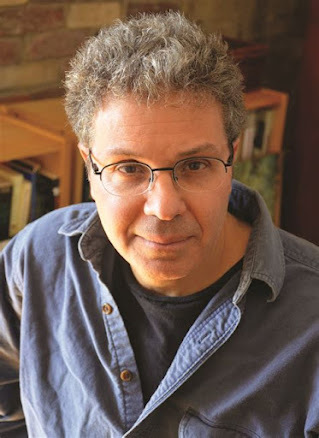
Cary Fagan is the author of eight previous novels and five books of short stories, including The Student, Great Adventures for the Faint of Heart, and A Bird’sEye. His latest is The Animals. He has been nominated for the Scotiabank Giller Prize, the Writers’ Trust Fiction Award, the Governor General’s Literary Award for Fiction, and has won the Toronto Book Award and the Canadian Jewish Book Award for Fiction. He is also an acclaimed writer of books for children, having won the Marilyn Baillie Picture Book Award, the IODE Jean Throop Book Award, a Mr. Christie Silver Medal, the Joan Betty Stuchner—Oy Vey!—Funniest Children’s Book Award, and the Vicky Metcalf Award for Literature for Young People. Fagan’s work has been translated into French, Italian, German, Dutch, Spanish, Catalan, Turkish, Russian, Polish, Chinese, Korean and Persian. He still lives in his hometown of Toronto.
1 - How did your first book or chapbook change your life? How does your most recent work compare to your previous? How does it feel different?
When I first began to produce and send out fiction, I had a difficult ten years of having book-length manuscripts turned down. Just to make myself feel better I published a chapbook of two short stories which I gave away and sent to various people. One of the people I sent it to was Timothy Findley and a few days later he phoned me to say he was going to mention me on CBC television as an up-and-coming writer. (That’s the sort of person Findley was). That was of course a real encouragement. It didn’t change my life but it helped me through those difficult years.
2 - How did you come to poetry first, as opposed to, say, fiction or non-fiction?
3 - How long does it take to start any particular writing project? Does your writing initially come quickly, or is it a slow process? Do first drafts appear looking close to their final shape, or does your work come out of copious notes?
It’s a little mysterious, how the initial idea comes to me, but when it does there’s a sense of excitement I feel that makes me know it’s the real thing. I may work on it right away but often I’ll wait months or years. I usually start a notebook so that I can write down any thoughts I have and eventually I start finding scenes. At some point I’ll be able to write down a scene list in order; that’s often what I use as the basis for an outline to get me through the first draft. The better the outline, the better my first draft, but still I don’t want it to be too detailed. Often I write the first draft by hand; after that it's on to the laptop. It’s the second and third drafts where I reshape and expand the story, so that it becomes what it needs to be. The drafts after that (another two to six drafts) are a matter of working on the weak spots, of pushing the end a little farther, of refining the voice and style.
4 - Where does a poem or work of prose usually begin for you? Are you an author of short pieces that end up combining into a larger project, or are you working on a "book" from the very beginning?
The last twenty years or more I’ve tended to think in book projects. So if I start writing stories, I imagine myself building towards a collection. This was true of my last one, “Great Adventures for the Faint of Heart,” and I think is why, although they are all different, there are some common thematic threads.
5 - Are public readings part of or counter to your creative process? Are you the sort of writer who enjoys doing readings?
Fiction writers don’t generally consider readings as important as poets do. Fiction is more, I imagine, a voice that a reader hears inside themselves. I usually only do readings after a new book comes out and I get invitations. That said, I do enjoy reading the work to an audience, and getting a sense of their response to it. (On the other hand, I do a lot of presentations to kids in schools and libraries for my kids’ books.)
6 - Do you have any theoretical concerns behind your writing? What kinds of questions are you trying to answer with your work? What do you even think the current questions are?
7 – What do you see the current role of the writer being in larger culture? Do they even have one? What do you think the role of the writer should be?
I’ve been dismayed to see the role of the writer diminish over the course of my professional life. That being said, I’ve never seen myself as a Richler, a Findley, or an Atwood—someone making large statements, in fiction or elsewhere, about where we are and where we are going. I’m writing in a more minor key. That’s the kind of writing I like best.
8 - Do you find the process of working with an outside editor difficult or essential (or both)?
I know that some writers consider a particular editor crucial to their work. This has never been true for me, perhaps because I’ve moved publishers every couple of books. Even when I stay, the editor often moves on. And as I only send a book out when I believe it is truly finished, I’m pretty lightly edited. That’s not to say that the editor doesn’t help to make the books better and I’m grateful for their expertise. Usually I’m a little anxious until I get the editor’s notes and know that we are on the same page and I can respond adequately to the issues raised. Even when their impact is minor, it’s important for lifting the book to the next level. I’ve been lucky to have worked with some very talented editors, most recently Peter Norman for The Animals.
9 - What is the best piece of advice you've heard (not necessarily given to you directly)?
My old friend Norman Levine once said to me (I’m sure it wasn’t the first time he said it) that a bad review can spoil your lunch but it should never spoil your dinner.
10 - How easy has it been for you to move between genres (poetry to short stories to children's books to novels to picture books to non-fiction)? What do you see as the appeal?
I write stories, novels, and books for kids—picture books and ‘middle grade’ novels. That didn’t happen right at the start but occurred over time. I now find that it keeps me writing. When I put down the draft of a novel in the morning I can pick up a kid’s manuscript in the afternoon. I love doing them all but certainly go through periods when my imagination is more attuned to one form or another for months or even a year at a time. And by now I can’t pretend that all the work doesn’t inform each other. My children’s work has influenced my adult and vice versa.
11 - What kind of writing routine do you tend to keep, or do you even have one? How does a typical day (for you) begin?
I usually have two writing sessions a day, one in the morning and one in the afternoon. If I can, I’ll have the second in one of the cafes near my home, or wherever I happen to be. I much prefer writing out in the world than at home. The ambient noise, the sense of being near people but not with them, helps me to concentrate. Plus the coffee’s better.
12 - When your writing gets stalled, where do you turn or return for (for lack of a better word) inspiration?
I usually have two or three manuscripts on the go so if something is not working I can put it down and pick up another. I’ve published a couple of books that I put down for ten or twelve years before picking up again. Reading also helps.
13 - What fragrance reminds you of home?
Gefilte fish?
14 - David W. McFadden once said that books come from books, but are there any other forms that influence your work, whether nature, music, science or visual art?
Music certainly. I am an avid amateur (very much amateur) musician and jam with friends every week. Music has often entered my work in one way or another.
15 - What other writers or writings are important for your work, or simply your life outside of your work?
I read a lot; it’s one of the great pleasures of life, isn’t it? At the moment I’m reading Colm Toibin’s new novel about Thomas Mann, Andrea Barrett’s book of stories Natural History, a book on early country music recordings by Tony Russell, a memoir by somebody who worked in a Paris restaurant for seven years, and a few different books of poetry. (I do read a lot of Canadian books, just not at this moment.). All of it feeds my own work and makes me want to write more and better. And one day if I stop writing, then I’ll just be a happy reader.
16 - What would you like to do that you haven't yet done?
I used to want to write plays as well, but I think that ship has sailed. I’ll be happy if I can just keep on keeping on.
17 - If you could pick any other occupation to attempt, what would it be? Or, alternately, what do you think you would have ended up doing had you not been a writer?
I like to work with my hands. I’ve built a couple of instruments and would have enjoyed being a luthier. Maybe a violin maker.
18 - What made you write, as opposed to doing something else?
I decided that I wanted to be a writer when I was about 12 so there really was never another option. Other than fireman.
19 - What was the last great book you read? What was the last great film?
Last great book? Maybe Jon McGregor’s novel, Reservoir 13. Last great film? Perhaps Drive My Car. My partner and I are trying to see as many films by the director, , as we can find.
20 - What are you currently working on?
I’m finishing the second draft of a new novel. And I better get back to it. Thanks for the questions!
January 28, 2023
new from above/ground press: seventeen new/recent titles (October 2022-January 2023),
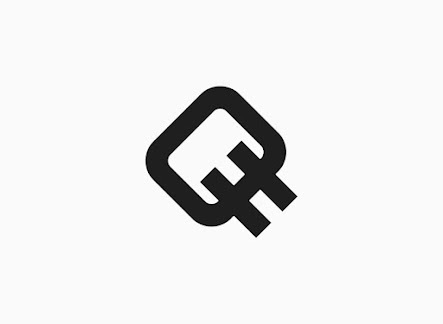 Happy New Year! and with the new year, comes above/ground press' THIRTIETH YEAR OF CONTINUOUS PRODUCTION (so you know exciting things are on the horizon, naturally); and did you hear we've already scheduled the spring edition of the ottawa small press book fair?
Happy New Year! and with the new year, comes above/ground press' THIRTIETH YEAR OF CONTINUOUS PRODUCTION (so you know exciting things are on the horizon, naturally); and did you hear we've already scheduled the spring edition of the ottawa small press book fair?but for now: SEVENTEEN NEW/RECENT TITLES: Perfumer’s Organ, by Lindsey Webb $5 ; Something or Other, by Jason Heroux $5 ; TAKE IT DOWN, by Barbara Henning $5 ; G U E S T #25, edited by Laurie Anne Fuhr $5 ; Touch the Donkey #36 $7 ; The Peter F Yacht Club #31 "The Factory Reading Series 30th anniversary" issue / edited by rob mclennan $5 ; ONTARIO HYDRO, by Derek Beaulieu $5 ; from RUBY WOUNDS, by Artie Gold & George Bowering $5 ; Teeth, by Douglas Glover $5 ; G U E S T #24, edited by Sara Lefsyk $5 ; The Goose, by Melanie Dennis Unrau $5 ; Report from the (Robert) Hogg Society Vol. 1 No. 1, edited by rob mclennan $7 ; Report from the (Pattie) McCarthy Society Vol 1. No. 1, edited by rob mclennan $7 ; glass / language / untitled / exaltation, by Jason Christie $5 ; Report from the (Helen) Hajnoczky Society Vol 1. No. 1, edited by rob mclennan $7 ; Red Heads, by Adrienne Adams $5 ; some of the raccoon poems, by Chris Johnson $5 ; (see the list of prior 2022 titles here
and keep an eye on the above/ground press blog for author interviews, new writing, reviews, upcoming readings and tons of other material;
published in Ottawa by above/ground press
October 2022 - January 2023
a/g subscribers receive a complimentary copy of each
To order, send cheques (add $1 for postage; in US, add $2; outside North America, add $5) to: rob mclennan, 2423 Alta Vista Drive, Ottawa ON K1H 7M9. E-transfer or PayPal at at rob_mclennan (at) hotmail.com or the PayPal button (above). Scroll down the extensive list of names on the sidebar (many, many things are still in print).
Review copies of any title (while supplies last) also available, upon request.
Forthcoming chapbooks by: Gil McElroy, Ben Robinson, Miranda Mellis, MLA Chernoff, Terri Witek, Geoffrey Olsen, William Vallières, Jessi MacEachern, Pete Smith, Julia Drescher, Robert van Vliet, Brad Vogler, Samuel Ace, Nathanael O'Reilly, Joseph Donato, Ben Jahn, Leesa Dean, Nick Chhoeun, Grant Wilkins, Isabel Sobral Campos, Mark Scroggins, Laura Walker, Jordan Davis, Andrew Gorin, Marita Dachsel, Stuart Ross, Angela Caporaso, Isabella Wang and Grant Wilkins! among others, most likely,
and 2023 subscriptions are still available! huzzah!
stay healthy! be safe! be nice to each other,
January 27, 2023
12 or 20 (second series) questions with Julie Doxsee
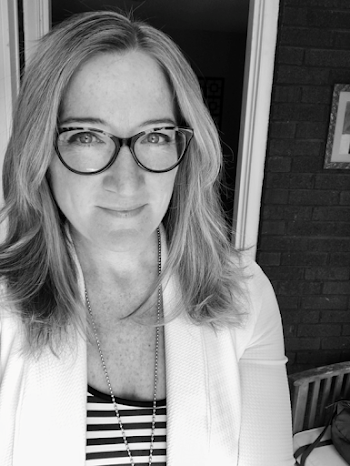
Julie Doxsee is the Canadian-American author of five books of poetry: The Fastening (Black Ocean, 2022), What Replaces Us When We Go (Black Ocean, 2018), The Next Monsters (Black Ocean, 2013), Objects for a Fog Death (Black Ocean, 2010), and Undersleep(Octopus Books, 2008). She holds a PhD in English and Creative Writing from the University of Denver (2007) and an MFA in Writing from the School of the Art Institute of Chicago (2002). Upon repatriating to the states after nine years in Turkey, she moved to Pennsylvania in 2016, where she is now Associate Professor of English at Harrisburg University.
1 - How did your first book change your life? How does your most recent work compare to your previous? How does it feel different?Funnily, I cracked open a copy of my first book, Undersleep, the other day for the first time in several years because I couldn’t remember much when I tried to recollect the signature poems therein. The return to the book was prompted by the memory of a significant event that recently arose via long-lost friend and it dawned on me that I may have included a poem about the event in Undersleep. My distance from the book object, as well as from that version of my poet self, meant I was reading a new book by a different poet (akin to the jolt of remembering a previous night’s dream while waiting at a red light or something). Back in 2006, publishing my first book changed my life; the Octopus Books crew, and then the Black Ocean crew, became my poet family. On an aesthetic level, my first collection was hewn from a secret recipe of University of Denver-inspired voices, friends, interests, books, styles, and editing advice. With each new book I publish, I have less and less exposure to these secret ingredients. The overall effect is The Fastening contains density that breathes with a grittier (more mature?) DNA, whereas the crafting of Undersleep left quite a lot of air and light on the pages. Also, I have lived and adulted 1000% since 2006.
2 - How did you come to poetry first, as opposed to, say, fiction or non-fiction?
I have only published poetry and poetry-leaning prose, but I started with multiple genres, as many institutional creative writers do. I discovered I was wired as a poet my senior year of college. I liked the freedom, the absence of rules, the legacy/movements, and the attention span involved in the act of writing poems. Also, like many of my poetry students today, I thought poetry was the best way to communicate the life of a confused, anxiety-ridden, identity-seeking, early-20s woman.
3 - How long does it take to start any particular writing project? Does your writing initially come quickly, or is it a slow process? Do first drafts appear looking close to their final shape, or does your work come out of copious notes?
Projects come on strong for me and manifest quickly after the initial spark. I start writing when preoccupation with the project nags to the point I can’t ignore it, then I write obsessively till I finish a first draft. Since I became a mother, this process is more difficult because I don’t have time to ride out the obsession. First drafts sit for a year or more in most cases, and the work of editing is where true enjoyment emerges for me; hence the first drafts tend to resemble distant cousins of the final manuscript. I think The Next Monsters is my only title that arose from copious journals and notes over a period of about 6 months.
4 - Where does a poem usually begin for you? Are you an author of short pieces that end up combining into a larger project, or are you working on a "book" from the very beginning?
This is a great question because I have never thought about it. The answer is: since grad school I have never conceived a single poem without conceiving a book-length work. I guess that means my education instilled a project-minded approach to my poetic undertakings.
5 - Are public readings part of or counter to your creative process? Are you the sort of writer who enjoys doing readings?
In before-COVID times I would have answered “absolutely” that readings are a part of the creative process, but now (mostly for personal and family reasons) I find it very difficult to tour, plan, travel, and even to arrange online events. I have attended some smashingly well-done online events since the pandemic began, but after spending all day every day teaching on camera for the better part of a year and a half from 2020-2022, I was exhausted by the idea of getting camera-ready and zooming up for a 2-dimensional audience. And now, in the aftermath of the aftermath of ebbing/flowing emergencies, I hardly think about doing readings. I am hoping this will change in 2023.
6 - Do you have any theoretical concerns behind your writing? What kinds of questions are you trying to answer with your work? What do you even think the current questions are?
The current questions for me are always about human decency, vulnerability, puzzling masculinity, love, sex, and the dilemmas of personal and societal unwellness. As for the general poetry community, questions are infinite and dynamic, which contributes to the wealth of the genre. I have never tried to answer questions in my poetry, but I have played with questions (exposed them, posed them) using the strange fabrics of language and thought. The writing of The Fastening exposed a necessary pissed-off voice, too, that brought healing and resolve.
7 – What do you see the current role of the writer being in larger culture? Do they even have one? What do you think the role of the writer should be?
In my professional life, in addition to teaching poetry classes, I foster the learning of very precise intentional, connotational, denotational uses of language—as well as responsible research. It is not easy, especially in the last decade or so, to advise long research projects in the Googleverse. I am also super uncomfortable with rapid-thumb-jab communication (generally speaking) while at the same time realizing communication naturally evolves (also, I love a TikTok wormhole, so I hesitate to claim that a writer/creator identity has been mortally wounded by smartphone ubiquity and scroll fixation). I guess my answer is that writers have extreme levels of power in larger culture, especially with so many informational/artistic platforms, but without responsible media and carefully vetted curation, I worry about the survival of writing, writers, attention spans, art, poetry, and brain health. Also, I can’t envision what my sons’ writing lives will look like as they continue their educations over the next decade plus (???). It’s scary, frankly; thinking about the loss of complex written forms leads me to fantasize about a Mary Ruefle computer-free, 100% poetic lifestyle.
8 - Do you find the process of working with an outside editor difficult or essential (or both)?
No (not difficult) and yes (essential). Having a dedicated reader/editor is part of the publication process, and necessary to the eventual appearance of the physical book. After long periods of editing my drafts, I am no longer the best audience for my work—I am fully ready to hand it over. I am lucky, I guess, that my editing sessions have been minimally invasive. For some authors this is not the case.
9 - What is the best piece of advice you've heard (not necessarily given to you directly)?
*You can’t be an artist if you don’t take risks, you can’t take risks if you hate embarrassment* (paraphrase)
11 - When your writing gets stalled, where do you turn or return for (for lack of a better word) inspiration?
I read, read, read as much as possible. I also work on booking travel in the not-far future. Another recent undertaking is exploring markets around my home for much-needed cultural exposure. Within a few miles of my home there are Indian, Nepali, Middle Eastern, Moroccan, Pan-Asian, and African markets, and international food stalls in the central market. These explorations are guaranteed to provide infinite eye and soul candy, interesting conversations with proprietors and customers, and also tasty non-American fare (hence dense fodder for the writer spirit).
12 - What fragrance reminds you of home?
Turkey will always be the most sensory of my homes, and where I felt most alive. Imagine lemon cologne, sage, sea-salty air, and mangal (wood barbeque).
13 - David W. McFadden once said that books come from books, but are there any other forms that influence your work, whether nature, music, science or visual art?
I don’t believe that books come from books; I believe reading is essential to the learning the music of poetic language, but life experience, including visual art, nature, science, travel, dreams, quirky encounters with humans and animals, and so on, are what make the poet a poet.
14 - What other writers or writings are important for your work, or simply your life outside of your work?
There are too many to list—so, so, so many. Need a book contract for this answer!
15 - What would you like to do that you haven't yet done?
I have many nonfiction writing projects I would like to work on, but I will likely have no time until I retire from academia. In fantasy I have many careers (I know this goes beyond the doable to-do list, but I seriously think about these things): stuntwoman, fisherwoman, medical doctor, actor, fiber artist, field reporter, attorney, stage diva, filmmaker, comedy performer, to name a few.
16 - If you could pick any other occupation to attempt, what would it be? Or, alternately, what do you think you would have ended up doing had you not been a writer?
See above.
17 - What made you write, as opposed to doing something else?
Need for flexibility/multi-faceted identity and no boss? Wiring? Becoming a writer was the easy choice when books vacuum-dragged me into this orbit years ago. I am wired as an artist and poet/linguist, so the choice was made for me. Theoretically, if I want to be someone else or choose a different identity, research and fictionalizing would allow me to live out some of the fantasy occupations referenced in #15.
18 - What was the last great book you read? What was the last great film?
Brian Evenson’s The Glassy, Burning Floor of Hell. Every Evenson sentence kicks my soul hard. After reading The Glassy, Burning Floor of Hell, I was shattered that I would never have the feeling of reading it for the first time again. I don’t recall ever feeling this way about a book.
I watch a lot of movies—sometimes as many as seven a week (couch + popcorn + twilight). Barbarian (2022) was the best of 2022 for me. The strange meandering plotline and creepy jump scares as well as the total eccentricity (without resorting to supernatural tackiness) was akin to encountering genius enjambment and then encountering it again and again. Barbarian upended the passive viewing that tends to occur with my voluminous intake. Like, there is no way I could fold laundry during my viewing of Barbarian let alone pause it for any reason.
19 - What are you currently working on?
A book about my son, who underwent an intense medical journey over the past few years.
January 26, 2023
Erin Robinsong, Wet Dream
I DON’T BELIEVE WE CAN SAVE OUR
CIVILIZATION; I DO, I DO BELIEVE IT
In vibratory consequence to the sea
I fall into the dimensions of an hour
The orcas are ‘done’ Karen told me last night over dinner
On oceanic anoxic tide of unfulfolded brain sadness
Done to in space encircle the earth in loops as lived undulations done
bodies singing voluminous extensions into the sawn-off oceans done
breathing out the tops of their heads
Along the same path the soul blasts at death, out the top of your head
sphincter through which eject spumes of feral joy, or fear breathe
for nearness to be whales / must be
And we’ll continue? Bleaching our wealth, our fame?
At Noba’s last night, in her partly built house with a feverish child
she said, time is a school. She said, you can use that
Earlier she said there’s this thing I always forget to do –
which is breathe in through the top of my head
and exhale out my chest, filling the room not only
but also
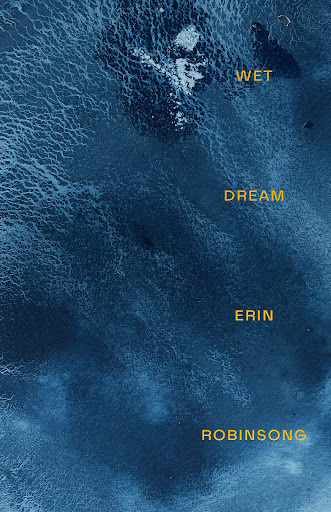 The follow-up to Montreal poet and interdisciplinary artist Erin Robinsong’sfull-length debut,
Rag Cosmology
(Toronto ON: BookThug, 2017) [see my review of such here], is
Wet Dream
(Kingston ON: Brick Books, 2022). The thirty-six lyric theses that together form the poetry volume Wet Dream are composed and stretched across an expansiveness; one that comes through mapping such a delicate array of sentenced parts that pool to form shapes. “Poetry is access to information. Yes.” she writes, as part of the poem “CAN YOU TAKE SOMETHING OUT / OF THIS WORLD, YES OR NO,” “Is a rose an archive, no / A memory, yes / of silky sense, yes / A garment? No / Many garments, yes [.]” Her narratives aren’t easy or straightforward, and the poems collected here simultaneously accumulate and collage; one might even say that Robinsong’s canvas stretches across the entire sky, allowing her poems to exist as the lines drawn between the stars she’s already set. “What if the fragility of the system is actually / the strength of the system?” she asks, to open the poem “TRANSFORMANCE 4,” “In wild carrot / intervals I dreamt exhaustively. Didn’t // want to go in the water so I didn’t.”
The follow-up to Montreal poet and interdisciplinary artist Erin Robinsong’sfull-length debut,
Rag Cosmology
(Toronto ON: BookThug, 2017) [see my review of such here], is
Wet Dream
(Kingston ON: Brick Books, 2022). The thirty-six lyric theses that together form the poetry volume Wet Dream are composed and stretched across an expansiveness; one that comes through mapping such a delicate array of sentenced parts that pool to form shapes. “Poetry is access to information. Yes.” she writes, as part of the poem “CAN YOU TAKE SOMETHING OUT / OF THIS WORLD, YES OR NO,” “Is a rose an archive, no / A memory, yes / of silky sense, yes / A garment? No / Many garments, yes [.]” Her narratives aren’t easy or straightforward, and the poems collected here simultaneously accumulate and collage; one might even say that Robinsong’s canvas stretches across the entire sky, allowing her poems to exist as the lines drawn between the stars she’s already set. “What if the fragility of the system is actually / the strength of the system?” she asks, to open the poem “TRANSFORMANCE 4,” “In wild carrot / intervals I dreamt exhaustively. Didn’t // want to go in the water so I didn’t.” Throughout the collection, Robinsong composes a staggered, staccato lyric, one that collides, contracts and layers. Her lyrics exist as dreamsongs, as monlogues on ecological anxiety, philosophical contemplation and the bearings of the heart. As she writes, mid-point, in the three-page poem “MYRTLE”: “And I thought love would be very // Clear and mysterious like a strange eye // That would see into and admit like // A sphincter into the flower in the heart // And was not wrong // But I didn’t know I could care so much about // The new shelves you’ve built in your room [.]” Her sentences swirl, offering a book on heat and water, heartbreak and ecological disaster. “The voice I heard spirals,” she offers, as part of the opening poem, “A REPLY,” “you could / say drills, it moved / the opposite way of direct / along the non-arrow of time / of being a person – / spiralic task / ridiculous task / often very shitty task / of being a person // I wanted to become one [.]” There is something quite interesting in the way her narrative lines ripple, forcing the eye to slow down to catch every tumble and sudden turn. And yet, this book is rife with optimism: one that manages to emerge through and despite all the empty, broken promises and ecological calamity. As the back cover offers: “Wet Dream is an expansive book of ecological thinking on a wet planet on fire.”
January 25, 2023
Karen Donovan, Monad + Monadnock
MEGAPLEX
I was becoming impatient.
My report was due and we were still on the first floor.
The next wallah played a repeating game:
“I’ve Got Bits of Fig in My Teeth.”
Say, wasn’t that an early piece
by Yoko Ono?
“Amplitude into blue sky” was the dessert.
People were throwing pennies into the potted palms.
It’s a wishing witch, you said, hoping to delight me.
The light was implacable.
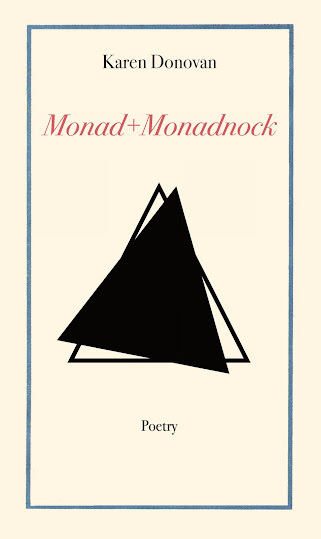 Berkeley poet Elizabeth Robinson recently recommended Rhode Island poet and editor Karen Donovan’s latest poetry title,
Monad + Monadnock
(Berkeley CA: Wet Cement Press, 2022), as I’d heard of neither author nor press before. The author of a handful of titles of poetry and short prose, Donovan’s gracefully-small collection of eighty pages is made up of sharp lyrics and deep cuts, direct lines and a stunning wit, moreso for its quickness and its subtlety. Hers is a lyric of leaps and odd precisions, takes that can turn on a dime, and questions so large that the lyric itself might burst but for the scope of her craft. “I wondered,” she writes, to open the poem “ALEPH NAUGHT,” “are we addressing a collection of / the so-called infinite? A bag with the world in it // plus anything is still the same bag. Half a bag / with the world in it is equal to the whole bag.” There’s something quite delightful the way her lines blur into each other, somehow simultaneously tethered and untethered from each other, offering a narrative of what could be seen as both imaginary breaks and a deceptive linkeage. Do these poems hold hints of surrealism or the foundations of reality, seemingly impossible but completely real? She writes of questions and clarifications, the biggest questions and impossible answers, offering specifics where once had been fog. Through Donovan, even the abstract has form, and what forms they are. As she writes to end the poem “NOW THAT THE WORLD IS / NO LONGER STRANGE”: “The flowers are real, the vipers are real. / Creation is singing.”
Berkeley poet Elizabeth Robinson recently recommended Rhode Island poet and editor Karen Donovan’s latest poetry title,
Monad + Monadnock
(Berkeley CA: Wet Cement Press, 2022), as I’d heard of neither author nor press before. The author of a handful of titles of poetry and short prose, Donovan’s gracefully-small collection of eighty pages is made up of sharp lyrics and deep cuts, direct lines and a stunning wit, moreso for its quickness and its subtlety. Hers is a lyric of leaps and odd precisions, takes that can turn on a dime, and questions so large that the lyric itself might burst but for the scope of her craft. “I wondered,” she writes, to open the poem “ALEPH NAUGHT,” “are we addressing a collection of / the so-called infinite? A bag with the world in it // plus anything is still the same bag. Half a bag / with the world in it is equal to the whole bag.” There’s something quite delightful the way her lines blur into each other, somehow simultaneously tethered and untethered from each other, offering a narrative of what could be seen as both imaginary breaks and a deceptive linkeage. Do these poems hold hints of surrealism or the foundations of reality, seemingly impossible but completely real? She writes of questions and clarifications, the biggest questions and impossible answers, offering specifics where once had been fog. Through Donovan, even the abstract has form, and what forms they are. As she writes to end the poem “NOW THAT THE WORLD IS / NO LONGER STRANGE”: “The flowers are real, the vipers are real. / Creation is singing.”
January 24, 2023
Jessica Laser, Planet Drill
CARRION COMFORT
I am the very sickness of my mouth. All March
mowing around beliefs called by some a home,
by me April’s coming anyway. Let it be rose-themed
and theme-colored so the roses match. All month
it’s been march. The sky breeds its pen, beckons
the enclosure over, the human vapor, the air of it now
a round clouds sing over and louder than—Olympian
dialect: I thought I heard mist. So children, laughing,
echo information. Let stir this house above the garland
and start the ocean where it melts and meet the horizon
and draw fate from its basin. Too much to dawn on.
Houses surface instead, town willing, to shed wide skin
you feel against your own failed field feed someone.
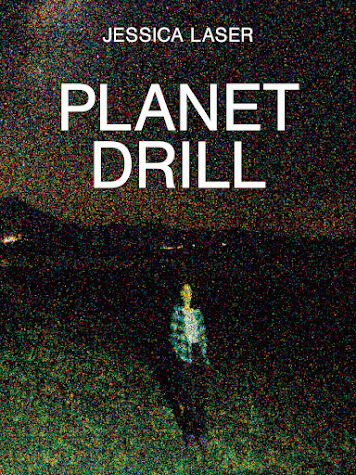 I was very pleased to hear of Chicago-born poet Jessica Laser’s latest,
Planet Drill
(New York NY: Futurepoem, 2022), recalling how struck I was by the work in her debut,
Sergei Kuzmich from All Sides
(Seattle WA: Letter Machine Editions, 2019) [see my review of such here]. The poems in Planet Drill are predominantly shorter, lyrically-compact first-person examinations, each line constructed as a kind of self-contained statement, set as a layering of poem-shaped brick-works. In certain ways, she constructs her poems around the shape of what otherwise couldn’t be seen without staffolding, allowing the poem to exist as the absence around which her poem draws. Listen to this stretch in the middle of the two-page poem “PLUMBER,” that reads: “I kept along my secret, plumbing / for keeps. State-employed, / I’m hungry, have glory, now money, / now sadness, now none, concern, / joy, fear, grief, / humility, anger, pride, peace, / I’m happy stricken, afflicted / with so deep a burning / of which ice is and can’t help.” There is a playfulness to her lyric of indirect direct statements, one that offers wry commentary and tongue-in-cheek swipes. “Nothing in pride but a flower.” she writes, to open “POEM WITH LIES,” “Nothing in a stare but glass life. / No fruit but a spore / and silent nectar. To remember / this is to bear all things. Life bears / no fruit but of too much color, stands / for taste where sun and taste ally.” Laser’s poems blur between surfaces and depth, moving in and out of focus at remarkable speed, and employing a precision that both illuminates and contorts. “A sad girl a sad alas is.” she writes, to open the poem “CRENELATIONS,” “Best to forfeit disposition. / All exposure. Best / Not to make / A judge love you, / Particularly / You.”
I was very pleased to hear of Chicago-born poet Jessica Laser’s latest,
Planet Drill
(New York NY: Futurepoem, 2022), recalling how struck I was by the work in her debut,
Sergei Kuzmich from All Sides
(Seattle WA: Letter Machine Editions, 2019) [see my review of such here]. The poems in Planet Drill are predominantly shorter, lyrically-compact first-person examinations, each line constructed as a kind of self-contained statement, set as a layering of poem-shaped brick-works. In certain ways, she constructs her poems around the shape of what otherwise couldn’t be seen without staffolding, allowing the poem to exist as the absence around which her poem draws. Listen to this stretch in the middle of the two-page poem “PLUMBER,” that reads: “I kept along my secret, plumbing / for keeps. State-employed, / I’m hungry, have glory, now money, / now sadness, now none, concern, / joy, fear, grief, / humility, anger, pride, peace, / I’m happy stricken, afflicted / with so deep a burning / of which ice is and can’t help.” There is a playfulness to her lyric of indirect direct statements, one that offers wry commentary and tongue-in-cheek swipes. “Nothing in pride but a flower.” she writes, to open “POEM WITH LIES,” “Nothing in a stare but glass life. / No fruit but a spore / and silent nectar. To remember / this is to bear all things. Life bears / no fruit but of too much color, stands / for taste where sun and taste ally.” Laser’s poems blur between surfaces and depth, moving in and out of focus at remarkable speed, and employing a precision that both illuminates and contorts. “A sad girl a sad alas is.” she writes, to open the poem “CRENELATIONS,” “Best to forfeit disposition. / All exposure. Best / Not to make / A judge love you, / Particularly / You.”



